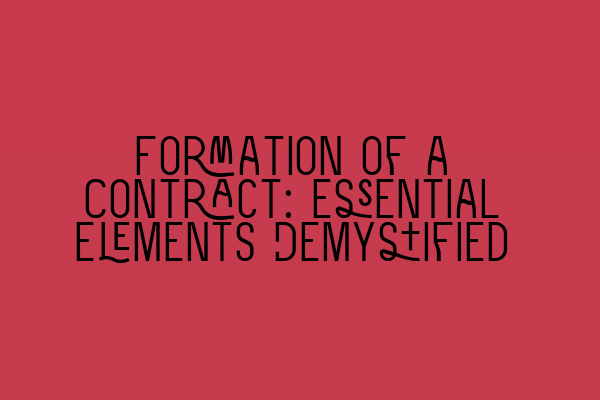Formation of a Contract: Essential Elements Demystified
Contracts are the backbone of any business transaction. Whether you are buying a car, leasing a property, or hiring a service, it is essential to have a solid understanding of the formation of a contract. In this article, we will demystify the essential elements that make up a contract and explain how they come together to create a binding agreement.
What is a Contract?
Before we dive into the intricacies of contract formation, let’s first define what a contract actually is. A contract is a legally enforceable agreement between two or more parties that creates rights and obligations for the involved parties. These rights and obligations are recognized by the law and can be enforced through the legal system.
Essential Elements of a Contract
In order for a contract to be valid and enforceable, it must contain certain essential elements. Let’s take a closer look at each of these elements:
1. Offer
The first step in forming a contract is the offer. An offer is a proposal made by one party to another indicating their willingness to enter into a contract. The offer must be clear, definite, and communicated to the other party. It should contain all the necessary terms and conditions of the contract, such as the price, quantity, and timeframe.
Related article: SQE 1 Practice Exam Questions
2. Acceptance
Once the offer is made, the next step is acceptance. Acceptance is the unequivocal agreement to the terms of the offer. It must be communicated to the offeror, either through words, actions, or silence, depending on the circumstances. It is important to note that acceptance must be on the same terms as the offer. Any material alterations to the offer would constitute a counteroffer.
Related article: SQE 1 Practice Mocks FLK1 FLK2
3. Consideration
Consideration is something of value that is exchanged between the parties. It can be in the form of money, goods, services, or even a promise to do or refrain from doing something. Consideration is essential to the validity of a contract as it ensures that both parties have something at stake and are bound by the terms of the agreement.
4. Intention to Create Legal Relations
In order for a contract to be valid, the parties must have an intention to create legal relations. This means that they must intend for their agreement to be legally binding and enforceable. In most commercial transactions, the presumption is that there is an intention to create legal relations. However, in certain social or domestic agreements, such as between family members or friends, there may be a presumption against legal intention.
5. Capacity
Capacity refers to the legal ability of a person to enter into a contract. In general, a person must have the mental capacity and be of legal age to be bound by a contract. Minors, mentally incapacitated individuals, and individuals under the influence of drugs or alcohol may lack the capacity to enter into a contract.
Related article: SQE 2 Preparation Courses
6. Genuine Consent
Genuine consent is an essential element of a valid contract. It means that the parties must enter into the contract freely and without any undue influence, fraud, misrepresentation, or mistake. If one party is coerced or deceived into entering a contract, their consent may be considered invalid, and the contract can be voidable or set aside.
7. Legality of the Object
Contracts must have a lawful object or purpose. The object of the contract must not be illegal, immoral, or against public policy. Any contract that involves illegal activities or aims to defraud or harm others is considered void and unenforceable by the courts.
Now that we have covered the essential elements of a contract, it is important to remember that contracts can come in various forms. They can be written, oral, or implied by the conduct of the parties. However, certain types of contracts, such as those involving the sale of land or the guarantee of another’s debt, must be in writing to be enforceable.
Related article: SQE 1 Preparation Courses
Conclusion
The formation of a contract can be complex, but understanding the essential elements is crucial to ensuring the validity and enforceability of your agreements. By carefully considering each element – offer, acceptance, consideration, intention to create legal relations, capacity, genuine consent, and legality of the object – you can confidently enter into contracts that protect your interests and rights.
For more information on contract law and preparing for the SQE exams, check out our related articles:
- SQE 1 Practice Exam Questions
- SQE 1 Practice Mocks FLK1 FLK2
- SQE 2 Preparation Courses
- SQE 1 Preparation Courses
Stay tuned for more informative articles and updates on SRA SQE exam dates.
Disclaimer: The information provided in this article is for general informational purposes only, and should not be construed as legal advice. For specific advice tailored to your situation, consult with a qualified solicitor.
